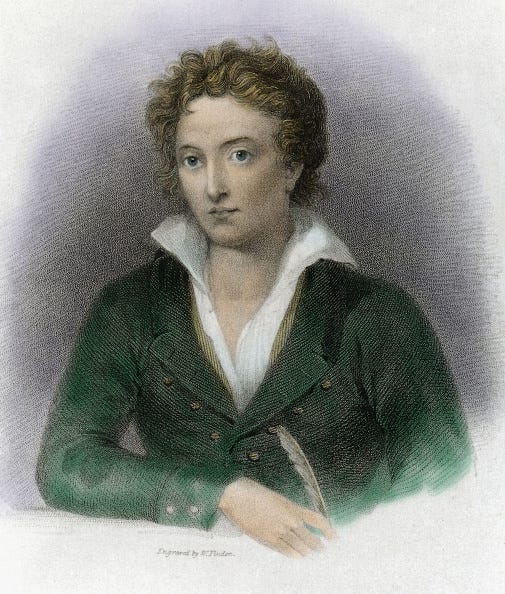The Writer's Almanac from Sunday, August 4, 2013
"Mutability" by Percy Bysshe Shelley, from The Complete Poems of Percy Bysshe Shelley. © Modern Library, 1994.
ORIGINAL TEXT AND AUDIO - 2013
It's the birthday of the English Romantic poet Percy Bysshe Shelley, born in Sussex, England (1792). His father was rich, landed, a member of the aristocracy and of Parliament, and had a huge inheritance set aside for his young son. Shelley went to prestigious English schools and enrolled at Oxford University where he was eventually expelled for writing a pamphlet called "The Necessity of Atheism." His father showed up at the school to intervene on his son's behalf, and Oxford's deans gave Shelley the option of staying at the university if he recanted the views that had gotten him in trouble. He refused to.
Instead, the 19-year-old Shelley eloped to Scotland with a 16-year-old girl, the daughter of an English pub owner. For this, his father disinherited him. He spent time in Ireland trying to get peasants to revolt. His marriage was not a happy one, and he often traveled alone abroad to escape his wife. Three years after his elopement, he abandoned his pregnant wife and their toddler son, and ran off with Mary Wollstonecraft Godwin, who would eventually become his wife, Mary Shelley, and the author of Frankenstein.
The Shelleys befriended the poet Lord Byron and their conversations helped inspire Shelley to write prolific amounts of poetry, including "Adonais," an elegy for his friend John Keats, and "Prometheus Unbound," a drama in verse. A month shy of his 30th birthday, he drowned in his schooner, the Don Juan, which sank in a storm off the coast of Italy. His decomposed, fish-eaten body washed ashore, and because of quarantine laws, it had to be cremated. Shelley's ashes were placed at Rome's Cemetery for Non-Catholic Foreigners, near an ancient pyramid replica and near the grave of his friend, poet John Keats.
Percy Shelley said: "Chameleons feed on light and air: Poets' food is love and fame."
It's the birthday of the poet Robert Hayden, born Asa Bundy Sheffey in Detroit (1913). When he went to college, W.H. Auden was his mentor. Hayden wrote about the black experience, in such poems as "John Brown's Body" and "Middle Passage," about the slave trade. But during the Black Power movement in the 1960s, he was criticized for his lack of militancy; at a writers' conference in 1966, they called him an "Uncle Tom." Still, he insisted on being known as a poet, not a black poet. He said there's "no such thing as black literature. There's good literature and there's bad. And that's all!"
Today is the birthday of President Barack Obama, born in Honolulu, Hawaii (1961). He's the author of the New York Times best-selling books Dreams from My Father (1995) and The Audacity of Hope (2006).
It's the birthday of Louis Armstrong, born in the birthplace of American jazz: New Orleans, Louisiana (1901). When asked to define jazz, Louis said: "Man, if you have to ask what it is, you'll never know."
Be well, do good work, and keep in touch.®
A Prairie Home Companion’s 50th Anniversary Tour will visit to the Norsk Høstfest in Minot, ND with our Special Guests: Christine DiGiallonardo, Rich Dworsky, Howard Levy, Chris Siebold, Larry Kohut, Tim Russell and Fred Newman.
Saturday, September 28, 2024 at 5:00 p.m. For details, click HERE!






In next year's entry for ROBERT HAYDEN
please mention his BAHA'I affiliation.
To omit it is like failing to mention electricity
when paying homage to Thomas Edison.
For example, from wikipedia:
As a supporter of his religion's teaching of the unity of humanity, Hayden could never embrace Black separatism.[9] Thus, the title poem of "Words in the Mourning Time" ends in a stirring plea in the name of all humanity:
Reclaim now, now renew the vision of
a human world where godliness
is possible and man
is neither gook nigger honkey wop or kike
but man
permitted to be man